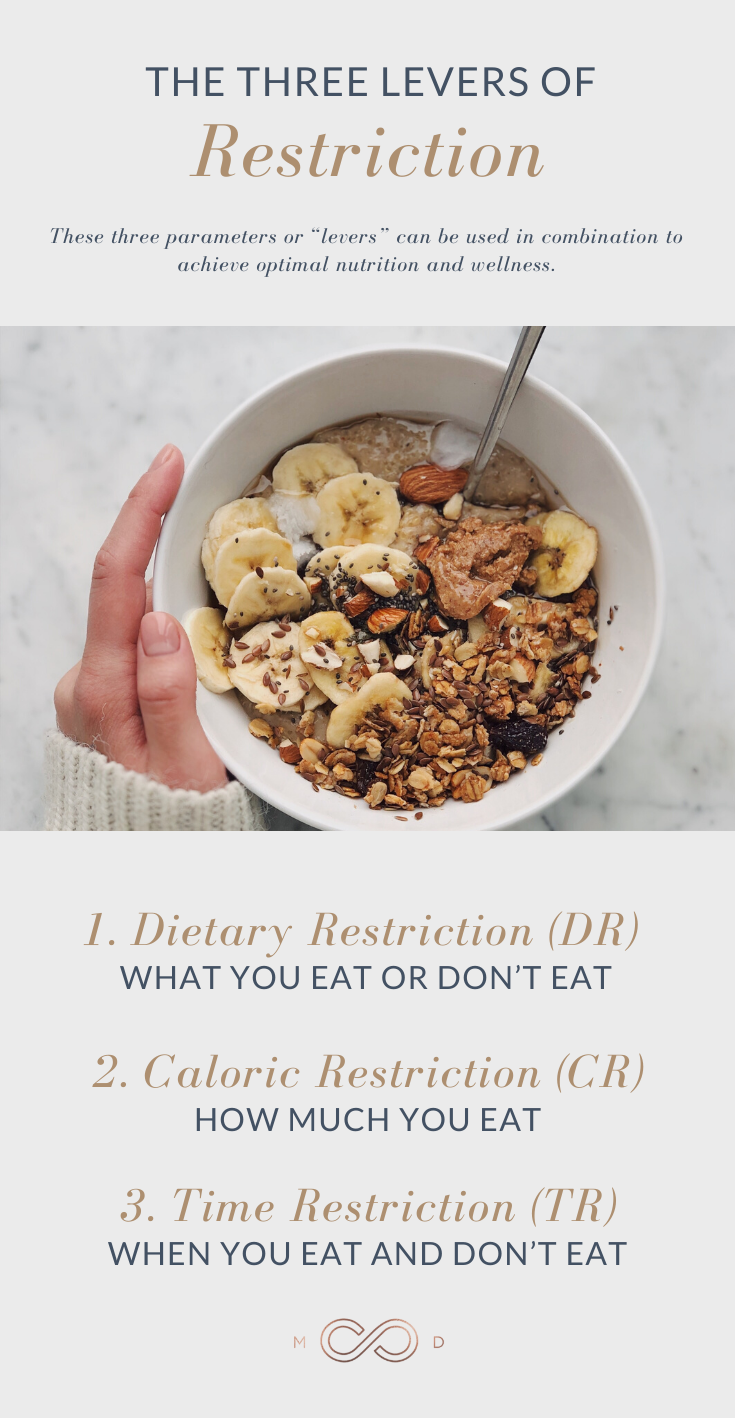Whether you’re surfing YouTube, browsing at Barnes & Noble, or flipping through Instagram posts, you can always find them: the “experts” telling you exactly what to eat.
Yet they all say something different.
Is the keto diet the way to go? Atkins? Mediterranean? South Beach? Every long list of nutritional advice offers a unique avenue to better health; some bring success, and others only bring frustration and disappointment.
My talented nurse practitioner, Jen Justus, and I believe we’ve been placing our weight loss focus on the wrong question.
“It’s the number one question we get in the exam room when we meet with patients,” Jen says. “‘What should I be eating?’ Or maybe they say, ‘I know what I should be eating, but I don’t really do it consistently.’ But when to eat never comes up.”
I’ve spent years studying and practicing in the obesity and weight loss space. During that time, I’ve advised countless patients on weight loss using a low-carb diet. But after a few eye-opening conversations about intermittent fasting with Zane Griggs, and after using it myself, I wondered… had I been missing a piece of the puzzle?
As a result, I’ve spent years digging deep into the power and potential of intermittent fasting. By focusing not just on what we eat, but on when we eat, we can do more than lose weight. We can optimize our bodies and minds to escape the jaws of fatigue and perform at maximum capacity.
The Three Levers of Restriction
I’m hopelessly curious, which is why I love to explore the ideas presented by industry leaders and trusted voices like Peter Attia.
Peter recently provided one of the most eloquent descriptions of nutrition that I’ve ever seen. Instead of focusing solely on food, Peter described his nutritional framework by outlining three forms of restriction. These three parameters or “levers” can be used in combination to achieve optimal nutrition and wellness:
- Dietary restriction (DR): What you eat or don’t eat
- Caloric restriction (CR): How much you eat or don’t eat
- Time restriction (TR): When you eat and don’t eat
While Lever 1 and Lever 2 can quickly become convoluted with calorie trackers, meal prep recipes, and costly grocery bills, only the time restriction lever offers simplicity. In fact, diligent use of time-restricted fasting (often known as intermittent fasting) is so effective that it can easily achieve the goal of Lever 2 as well!
This is important to know since most people need to pull at least two levers to achieve sustainable weight loss.
What Exactly Is Time-Restricted Fasting?
Time-restricted fasting and intermittent fasting are both terms used to describe the process of limiting when your body takes in food to a certain time window. For example, you might have an 8-hour eating window between 12:00 p.m. and 8:00 p.m., followed by a 16-hour fasting window from 8:00 p.m. to 12:00 p.m. the following day.
This type of time-restricted eating forces the body to burn fat for fuel since it can’t access glucose from your last meal or snack. At the same time, intermittent fasting automatically restricts your calorie intake as well. With Lever 2 and Lever 3 already “pulled,” any improvements you make to Lever 1’s eating habits — reducing carbs, increasing lean protein, etc. — just helps to achieve more dramatic results!
Intermittent Fasting and Decision Fatigue
Beyond weight loss, intermittent fasting offers some surprising benefits, such as its ability to reduce decision fatigue. You know the feeling of decision fatigue well, even if you’ve never put a name to it.
Decision fatigue is the wall you hit when your energy and focus become completely depleted. It’s most notable at the end of a long day at work when Excel sheets and emails start swirling into a blur and simple tasks start taking five, 10, or even 20 minutes. You shut your laptop and think, “I’m done. I need to go home.”
Some of the most brilliant and influential people in the world understand the dangers of decision fatigue, which is exactly why they eliminate unnecessary choices from their routine. Mark Zuckerberg and Mark Cuban, for instance, wear basic t-shirts and jeans every single day. Steve Jobs became known as much for his iconic black turtleneck and khakis as for his technological innovations. By avoiding the numerous questions and decisions that surround the wardrobe process, these billionaires preserve their focus for more important matters.
Decision fatigue may even exhibit itself in court rulings. An interesting study that examined 1,100 parole board hearings found that favorable outcomes, like probation and rehabilitation, dropped from 65% at the beginning of a “decision session” to nearly 0% at the end of each session. Decision sessions lasted from mealtime to mealtime, and the precipitous decline in favorable outcomes suggests that decision fatigue set in as the sessions wore on.
The tedious nature of making decision after decision makes all of us, even those in prestigious positions, less efficient as the day progresses.
We may not be billionaires or judges, but we still make significant decisions hour after hour. Doesn’t it make sense to harness your finite energy for the decision-making that matters? Placing so much focus on planning, prepping, and affording three or four meals each day has the same effect as an app running in the background on your phone: It drains your battery.
And what happens if you’re deciding while hungry, overwhelmed, and depleted? If there’s one thing I know about human behavior and fatigue, it’s that tired people make terrible decisions about food. That’s exactly how you find yourself pulling through the drive-thru and scarfing down a greasy hamburger.

Intermittent fasting helps avoid decision fatigue by eliminating the need for food choices and meal preparation until lunch or dinnertime arrives. Imagine how many other impactful decisions you can make when you don’t have to obsess over those clean-eating recipes or calorie calculations.
Jen recently embraced intermittent fasting and was surprised by the freedom of having fewer choices.
“Fasting eliminates that one meal I have to worry about every day,” Jen says. “Before, I was so worried about breakfast, what I was going to eat, when I was going to eat it, meal prepping, how that was going to happen…. [Now] I just start with lunch and move on.”
Unlock Fasting Energy and Focus
One of the many benefits of intermittent fasting is unlocking fasting energy and focus. When your diet is high in simple carbohydrates like sugar, you’re more likely to experience sugar-induced brain fog and energy crashes. This can impact your mood and decrease focus.
But when you’re fasting, your body uses ketones for energy. Ketones come from the stored fat in your body and are the brain’s optimal form of fuel. They help you focus and think more clearly.
A psychological benefit of intermittent fasting is that when you resist short-term gratification (like having a big, sugary donut first thing in the morning) in favor of long-term health goals (delaying diabetes and heart disease as long as possible), you end up happier and healthier. And isn’t that what we’re all after?
Fasting and Metabolism
Some people try to argue that skipping meals slows down metabolism, causing you to hold on to body fat and gain weight over time. But the more we learn about intermittent fasting, the more we realize that isn’t true.
Intermittent fasting creates a boost in fat-burning hormones like norepinephrine and a drop in fat-storing hormones like insulin. When you fast, insulin levels fall, which facilitates fat burning. Norepinephrine breaks down fat cells into fatty acids, which the body and brain use for fuel.
A major benefit of fasting over calorie restriction is that it burns fat while helping retain muscle mass. Lean muscle is crucial for a high metabolism because it requires more energy to maintain, even when the body is at rest. So when you’re fasting, your body breaks down fat for fuel but leaves the muscle alone, leaving you strong and healthy.
Finding Your Fasting Rhythm
Jen practices what she preaches, which includes intermittent fasting four days a week. “My husband and I usually eat dinner no later than seven, so I will do my time-restricted window and eat my first meal between noon and 2 p.m. depending on how I’m feeling,” she explains.
“And then for one day out of the week, I try, and I don’t always get there, but I try to do a 24-hour fast.”
Though Jen doesn’t use intermittent fasting over the weekend, a restricted eating window during the week has already delivered encouraging results. She’s watched her body fat decrease, her cravings get wiped out, and her appetite reduce.
That’s the beauty of intermittent fasting: flexibility! There’s no right or wrong way to fast. The way Jen fasts doesn’t have to match the way you fast.
At its most basic level, time-restricted fasting can be whatever you need it to be, and it can be different every day. The longer you go without putting your body in a fed state, the faster you can chisel away fat, but the exact rhythm of your fasting is up to you.
“I’ve toyed with other forms of fasting and meal replacements that we’ve used in the past, but never really achieved this reduction in cravings to where I don’t go home and want to raid the refrigerator or cabinet and eat something unhealthy,” Jen says, explaining the noticeable difference intermittent fasting can make right away.
Time-restricted fasting has even helped Jen normalize her blood sugar. Before intermittent fasting, her hemoglobin A1C was creeping toward the pre-diabetic range, but now it’s steadily moving back into balance.
“For me personally, having done a lot of different diets in my past, it’s just been a game changer in a lot of different ways.”
A Guide to Beginning Your Own Weight Loss Journey
As you’re navigating your weight loss journey, ask yourself the same questions that Jen asks all of her patients before deciding which diet or method offers the best path forward.
First, identify your goals. Do you want to lose 30 pounds? Tone up with lean muscle? Regain your energy and drive? Maybe a combination of all three! Your goal sets you in the right direction.
Next, consider the “data” your body has to offer, including:
- Body fat
- Muscle mass
- Resting metabolic rate
- Hormone levels
- Thyroid function
These numbers matter because they influence your weight loss experience. For example, you could be doing everything right, but if you’re suffering the symptoms of thyroid dysfunction, you won’t achieve the progress you seek until your thyroid is properly treated.
It’s also important to consider your current and past experiences. What are you currently eating each day? Have you used methods in the past that worked well or left you feeling disappointed? All of these factors weave together to create your unique weight loss profile.
You might even need to unlearn certain rules and principles, especially that misleading adage that Breakfast is the most important meal of the day! Grape Nuts told us that, but we know now it’s most definitely not.
To put all of this together into a coherent and successful weight loss plan, it’s helpful to find a practitioner who appreciates and understands the many layers of weight loss and wellness. You don’t need someone to charge you $150 to only prescribe a 1,200-calorie low-carb diet.
How to Overcome Intermittent Fasting Fatigue
Intermittent fasting fatigue usually hits in the early days of your time-restricted fasting journey. If your body isn’t used to burning fat stores for energy (because it uses glucose from meals instead), it can take a while to get used to the new paradigm. A few healthy practices can help.
Drink Water
To decrease the effects of intermittent fasting fatigue, drink more water during your fasting window. Staying well-hydrated keeps your cells functioning properly while your body turns stored fat into energy. A good goal is to drink half your body weight in ounces of water. So if you weigh 150 pounds, try to drink 75 ounces of water throughout the day.
Keep a Food Diary
When you do eat, keep track of what and how much you eat, as well as how it makes you feel. If you feel your energy crashing after you break your fast, maybe you need to include more lean protein and fewer carbohydrates in that meal. You may also find that you aren’t eating enough during your non-fasting window. Being mindful of the food you eat can go far in helping you understand how food choices affect your mood and energy.
Sleep More
Your intermittent fasting fatigue could also just be your body telling you that you need more sleep. Adjusting to time-restricted fasting can be demanding on your body as it shifts to breaking down stored fat rather than burning glucose from a steady flow of meals and snacks. Make sure you’re giving your body time to rest and recover, and aim to get at least seven hours of sleep each night.
Compassionate Care in Action
Here at Brentwood MD, we care for some of the most amazing, successful, driven people. Yet the amount of overwhelm most of them feel is stunning.
The practice of medicine is an art, and every patient brings new colors to our experience. Jen shared a story of a patient who put incredible pressure on herself to fix every perceived fault and flaw at once.
“And I stopped her,” Jen recalls, “I said, ‘Hold on. We’re working on one thing at a time. The first thing we’re going to do is get you feeling better to where you want to do those other things. So let’s just correct your hormones, and then we’ll move on.’ And you could just see the weight of the world melt off her shoulders.”
Jen’s story highlights a thought I’ve been considering for a while. In a modern world, there’s nothing we can’t know if we have access to the web and curiosity. So if we’re struggling with breakthroughs and accomplishments, it’s not because we’re ignorant or lacking insight; it’s because we’re overwhelmed!
Jen offers some famous last words: “The question you have posed today, of not what you should be eating but when, is huge. It’s made a huge difference in my life. It makes a difference in my patients’ lives.”
With so much information at our fingertips, where can we find wisdom? Well, that’s the role of a strategic, compassionate physician and friend, and it’s the precise reason Brentwood MD exists.

Dr. Aaron Wenzel is a concierge physician specializing in the care of fast-moving entrepreneurs, executives, and public figures in the Nashville, TN area. Dr. Wenzel’s diverse life experience and extensive training in family medicine, emergency care, nutrition, and hormone replacement therapies give him the unique platform to provide unmatched care for his patients.







